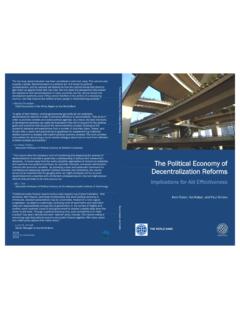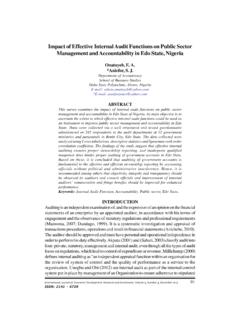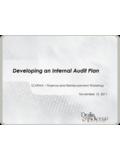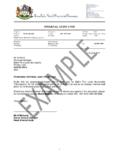Transcription of Best Practices for Internal Audit in Government …
1 best Practices for Internal Audit in Government Departments 1. Introduction Traditionally, people understand Internal Audit as an activity of self imposed Internal check and Audit which also supposedly involved the activity of going around telling people what they were doing wrong. However even if one sees it in a narrow sense , the contribution of the activity of Internal Audit is potentially of major importance as an effective Internal Audit system leads to improved accountability, ethical and professional Practices , effective risk management, improves quality of output and supports decision making and performance tracking.
2 Historically it was always held that Internal auditing is confined to merely ensuring that the accounting and allied records have been properly maintained, the assets management system is in place in order to safeguard the assets and also to see whether policies and procedures are in place and are duly being complied with. With changing times this concept has undergone a sea change with regard to its definition and scope of coverage. Modern approach suggests that it should not be restricted to financial issues alone but also on issues such as cost benefit analysis, resource utilisation and their deployment, matters of propriety, effectiveness of the management, etc.
3 Internal Audit is to be understood as an independent and objective appraisal service within an office/organisation. The Institute of Internal Auditors of UK and Ireland defines Internal Audit as: Internal Auditing is an independent, objective assurance and consulting activity designed to add value and improve an organisation's operations. It helps an organisation accomplish its objectives by bringing a systematic, disciplined approach to evaluate and improve the effectiveness of risk management, control, and governance processes.
4 The Institute of Internal Auditors New York defines Internal Audit as: Internal Audit is an independent, appraisal activity within an organisation for the review of accounting, financial and other operations on the basis as a basis of service to the organisation. It is a managerial control which functions by measuring and evaluating the effectiveness of other controls . The above definitions of Internal Audit call for Internal Audit , to be an independent function within an organisation placing greater emphasis on its objectivity.
5 Thus Internal auditing primarily provides an independent objective opinion to the Head of the Government department / Office. The findings of an independent focused Internal Audit function also brings to the fore its findings and recommendations which act as a tool to officers in a department to take suitable corrective action and help in plugging the loopholes which would otherwise go undetected for a considerable period of time. The definitions stress on two aspects of Internal Audit assurance and consultancy.
6 It is important that in fulfilling both these roles, Internal Audit remains independent of the project. It is the management's responsibility primarily to manage the project and they should therefore make the decisions, but Internal Audit could act as a facilitator within this process. 1 For example, management should identify the risks associated with the project and decide how to deal with them with Internal Audit , acting as a consultant on risk and control matters.
7 The golden principles that state the Code of Ethics for Internal Auditors in Government are Integrity, Objectivity, Competency, Confidentiality and Independence. a. Integrity: Integrity is expected in aspects of the Internal Audit work. The principles of honesty and fairness are to be observed. The basic point that is raised here is that his report should bring with it an air of trust, reliance and fairness. b. Objectivity: Professional competency and assessment of facts with utmost care is a pre requisite for a good Internal auditor.
8 An Internal auditor should refrain from making reckless and irresponsible statements or resorting to expressions without proper evidence. c. Competency: An Internal auditor is expected to apply appropriate skill and knowledge combined adequately with experience. An Internal auditor should refrain from undertaking works that are outside his scope or beyond the scope of his skill and competence. Performance of the Audit and preparation of the report require due professional care by persons possessing adequate training, experience and competence in auditing.
9 The majority of staff development, however, results from on the job training where auditors assist in the training of other, less experienced staff members. Each auditor must be responsible for continuing his/her education in order to maintain their proficiency. This involves keeping abreast of current developments in auditing standards, procedures and techniques. d. Confidentiality: The Internal auditor should safeguard all information received by him as most of them may be of confidential nature.
10 There shall be no spill out of possessed information unless there is a statutory, legal and professional requirement to do so. e. Independence: As the definition states, Internal Audit is an independent appraisal activity. We need to carefully note here that the word independent is important, even though it gets neutralised by the fact that it is within an organisation. Independence stands for an Internal auditor being able to report on material facts and figures, uninfluenced by any favor or frown.















